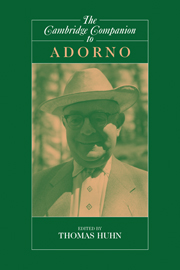Book contents
- Frontmatter
- Introduction: Thoughts beside Themselves
- 1 Negative Dialectic as Fate
- 2 Weighty Objects
- 3 Adorno, Marx, Materialism
- 4 Leaving Home
- 5 Is Experience Still in Crisis? Reflections on a Frankfurt School Lament
- 6 Mephistopheles in Hollywood
- 7 Right Listening and a New Type of Human Being
- 8 Authenticity and Failure in Adorno’s Aesthetics of Music
- 9 Dissonant Works and the Listening Public
- 10 Adorno, Heidegger, and the Meaning of Music
- 11 The Critical Theory of Society as Reflexive Sociology
- 12 Genealogy and Critique
- 13 Adorno’s Negative Moral Philosophy
- 14 Adorno’s Social Lyric, and Literary Criticism Today
- 15 Adorno’s Tom Sawyer Opera Singspiel
- Select Bibliography
- Index
10 - Adorno, Heidegger, and the Meaning of Music
Published online by Cambridge University Press: 28 May 2006
- Frontmatter
- Introduction: Thoughts beside Themselves
- 1 Negative Dialectic as Fate
- 2 Weighty Objects
- 3 Adorno, Marx, Materialism
- 4 Leaving Home
- 5 Is Experience Still in Crisis? Reflections on a Frankfurt School Lament
- 6 Mephistopheles in Hollywood
- 7 Right Listening and a New Type of Human Being
- 8 Authenticity and Failure in Adorno’s Aesthetics of Music
- 9 Dissonant Works and the Listening Public
- 10 Adorno, Heidegger, and the Meaning of Music
- 11 The Critical Theory of Society as Reflexive Sociology
- 12 Genealogy and Critique
- 13 Adorno’s Negative Moral Philosophy
- 14 Adorno’s Social Lyric, and Literary Criticism Today
- 15 Adorno’s Tom Sawyer Opera Singspiel
- Select Bibliography
- Index
Summary
In an outline of ca. 1949 for a never-written work on The History of German Music from 1908 to 1933, Adorno remarks that, when the Nazis took over, they hardly needed to suppress 'cultural-bolshevist' music - that is, 'new music', such as that of Berg or Schoenberg - because the suppression had already largely taken place within the realm of 'so-called new music' itself, so that 'certain late forms of new music (Weill's Bürgschaft) could be taken over almost unchanged by fascist composers (Wagner-Régeny)'. Adorno continues,
In the historical analysis of this section [of the proposed book] the idea is to be developed via the model of music that the decisive changes, whose drastic expression is the seizure of power by fascism, take place in such a deep stratum of social life that the political surface does not decide at all, and that these experiences of the depths, as they are connected to the problem of unemployment and the elimination of the rising bourgeoisie (crisis of the opera), are strikingly expressed in an apparently as derivative area of culture as that of music.
Understandably, many approaches to the philosophy of music or to musicology are liable to treat such statements with more than a hint of scepticism. Is it possible to legitimate an approach to music which thinks it is more likely, as Adorno claims in a related context, that one will arrive at historical insight by ‘a really technically strict interpretation of a single piece like the first movement of the Eroica that makes its discoveries transparent as discoveries about society’ than, for example, by looking at the broad history of musical styles or, indeed, at the social and economic conditions of musical production and reproduction?
- Type
- Chapter
- Information
- The Cambridge Companion to Adorno , pp. 248 - 278Publisher: Cambridge University PressPrint publication year: 2004
- 1
- Cited by

